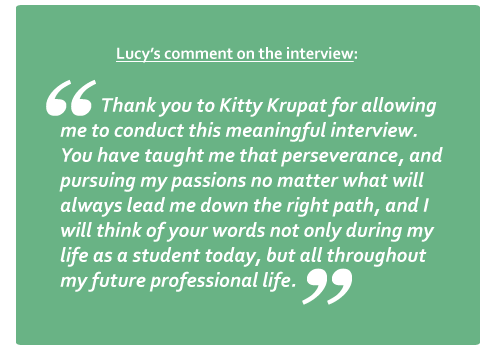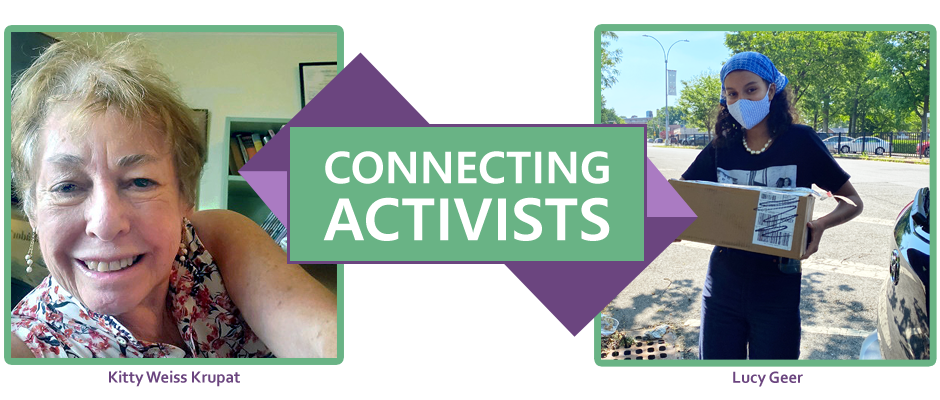Lucy Geer, Imagine Society activist, interviewed 2020 Clara Lemlich Honoree Kitty Krupat on May 28, 2020

 I was so excited to talk to Kitty Krupat, recipient of the 2020 Clara Lemlich Award for women who have accomplished incredible careers of social activism! I was first eager to find out how she got into social activism. See below an account of an interview I conducted with Ms. Krupat on May 28, 2020.
I was so excited to talk to Kitty Krupat, recipient of the 2020 Clara Lemlich Award for women who have accomplished incredible careers of social activism! I was first eager to find out how she got into social activism. See below an account of an interview I conducted with Ms. Krupat on May 28, 2020.
 In her earliest childhood, Kitty Krupat was around her father who was a doctor for the workingclass community. She became friends with his patients and became interested in social issues and different ethnicities. It was in his office that Kitty also became conscious of racism and classism. This experience made a lasting impression on her. KItty developed an understanding of complex societal issues at an early age, both from exposure to different walks of life, and also through a voracious appetite for reading.
In her earliest childhood, Kitty Krupat was around her father who was a doctor for the workingclass community. She became friends with his patients and became interested in social issues and different ethnicities. It was in his office that Kitty also became conscious of racism and classism. This experience made a lasting impression on her. KItty developed an understanding of complex societal issues at an early age, both from exposure to different walks of life, and also through a voracious appetite for reading.
As a young woman, Ms Krupat’s main ambition was to be an actress but realized she wouldn’t be able to sustain herself that way, so she needed to find another outlet to utilize her creative energy. She started working in publishing, and became an editor. Once in the publishing industry, she saw that salaries were very low for people in creative fields. Especially for women. At this point she became interested in the labor movement - it was all around her - but shen ever imagined she would be a part of it. But seeing and experiencing unfair conditions, helped Kitty Krupat decide that she needed to do something about it.
One of the defining moments of Kitty’s early activism was when she organized a strike with a group of women, and they all decided to join together to start a movement and form committees. Kitty was elected to be their spokesperson.
 What inspired Kitty Krupat to do the activist work she’s done?
What inspired Kitty Krupat to do the activist work she’s done?
 The defining moment for Ms Krupat was when she went to The March on Washington in 1963 (also known as March on Washington for Jobs and Freedom) - a major milestone in the history of the fight for civil rights for African Americans. She saw ordinary people coming together in solidarity, ordinary people coming together to change the world. The experience changed her life forever. She also has met many people in the labor movement there!
The defining moment for Ms Krupat was when she went to The March on Washington in 1963 (also known as March on Washington for Jobs and Freedom) - a major milestone in the history of the fight for civil rights for African Americans. She saw ordinary people coming together in solidarity, ordinary people coming together to change the world. The experience changed her life forever. She also has met many people in the labor movement there!
 What were some of the problems she encountered along the way?
What were some of the problems she encountered along the way?
 Kitty told me that she had to work to overcome her own biases, and misconceptions. She had to actively work to overturn them. Ms Krupat learned and worked to combat and learn from privilege and elitism.
Kitty told me that she had to work to overcome her own biases, and misconceptions. She had to actively work to overturn them. Ms Krupat learned and worked to combat and learn from privilege and elitism.
At the ground level she saw that women were able to lead while the Vietnam War washappening but when the war ended the men pushed them back out. When Ms Krupat first cameinto the Labor Movement they were hiring a lot of women during the mid 1970s. However most of these women had a very difficult time gaining acceptance. More often than not, they were dismissed by their male coworkers. This prompted Kitty to initiate a fight against this sexism within the labor union.
 What about unexpected pleasures has Kitty Krupat ’s work provided?
What about unexpected pleasures has Kitty Krupat ’s work provided?
 Ms. Krupat told me how meaningful it has been to work with people. She’s been able to develop very profound relationships. Her life has been enriched by solidarity and it has a real meaning to her. The people she met have become lifelong friends and comrades.
Ms. Krupat told me how meaningful it has been to work with people. She’s been able to develop very profound relationships. Her life has been enriched by solidarity and it has a real meaning to her. The people she met have become lifelong friends and comrades.
Kitty Krupat went to Graduate School (American Studies) at age 57. She says it was an integral part of her development to finish her education. She learned the activist life and the intellectual life are deeply connected. This helped her activist work. Learning about all these topics in a new way was a huge unexpected pleasure. She became a labor academic.
Another unexpected pleasure that Ms. Krupat mentioned was the feeling of winning when she achieved her goals. Every victory was a stride towards equal rights, and seeing the people she has been fighting for benefiting from her work was and is extremely rewarding.
Throughout her years of work and service she has also realized that her three careers are interconnected and each one set her up for success in the others. Her three careers or titles were, as she put them: an Editor, an Organizer, and an Academic. She is able to incorporate these three skills into everything she does and is grateful that she gets to utilize and connect allof her passions as a professional.
Right now Ms Krupat is doing a lot of work with the new sanctuary coalition. Working with immigrants is a pretty new experience for her. With President Trump elected immigrant issues have been escalating. Kitty was retired but she knew she had to be involved in helping immigrant rights. She’s always felt the need to be active. But now she wanted to work with individual people, which was a brand new kind of activism for her. In her past experience she used to work with larger scale companies. During this time she’s learned a huge amount about immigration law too. As Ms Krupat tells me, it has been a very humbling experience seeing people struggle under President Trump’s immigrant policies.
 I asked what advice Ms Krupat would give to us for becoming lifelong activists?
I asked what advice Ms Krupat would give to us for becoming lifelong activists?
 Kitty said she typically doesn’t like to give advice, because she feels that everyone in this world should figure out who they are, to truly think about it. To figure out what you’re most passionate about, and concerned about in this world and embrace it fully.
Kitty said she typically doesn’t like to give advice, because she feels that everyone in this world should figure out who they are, to truly think about it. To figure out what you’re most passionate about, and concerned about in this world and embrace it fully.
Ms Krupat told me “Ask yourself: What is your place in the world?” She had to unlearn that shewas not the center of her world. She also added: “Don’t forget to do what you love - that's thebest work you do.”


